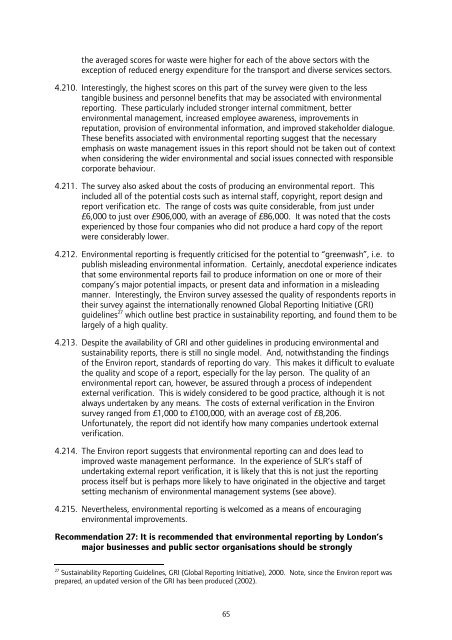London Wider Waste Strategy - London - Greater London Authority
London Wider Waste Strategy - London - Greater London Authority
London Wider Waste Strategy - London - Greater London Authority
You also want an ePaper? Increase the reach of your titles
YUMPU automatically turns print PDFs into web optimized ePapers that Google loves.
the averaged scores for waste were higher for each of the above sectors with the<br />
exception of reduced energy expenditure for the transport and diverse services sectors.<br />
4.210. Interestingly, the highest scores on this part of the survey were given to the less<br />
tangible business and personnel benefits that may be associated with environmental<br />
reporting. These particularly included stronger internal commitment, better<br />
environmental management, increased employee awareness, improvements in<br />
reputation, provision of environmental information, and improved stakeholder dialogue.<br />
These benefits associated with environmental reporting suggest that the necessary<br />
emphasis on waste management issues in this report should not be taken out of context<br />
when considering the wider environmental and social issues connected with responsible<br />
corporate behaviour.<br />
4.211. The survey also asked about the costs of producing an environmental report. This<br />
included all of the potential costs such as internal staff, copyright, report design and<br />
report verification etc. The range of costs was quite considerable, from just under<br />
£6,000 to just over £906,000, with an average of £86,000. It was noted that the costs<br />
experienced by those four companies who did not produce a hard copy of the report<br />
were considerably lower.<br />
4.212. Environmental reporting is frequently criticised for the potential to “greenwash”, i.e. to<br />
publish misleading environmental information. Certainly, anecdotal experience indicates<br />
that some environmental reports fail to produce information on one or more of their<br />
company’s major potential impacts, or present data and information in a misleading<br />
manner. Interestingly, the Environ survey assessed the quality of respondents reports in<br />
their survey against the internationally renowned Global Reporting Initiative (GRI)<br />
guidelines 27 which outline best practice in sustainability reporting, and found them to be<br />
largely of a high quality.<br />
4.213. Despite the availability of GRI and other guidelines in producing environmental and<br />
sustainability reports, there is still no single model. And, notwithstanding the findings<br />
of the Environ report, standards of reporting do vary. This makes it difficult to evaluate<br />
the quality and scope of a report, especially for the lay person. The quality of an<br />
environmental report can, however, be assured through a process of independent<br />
external verification. This is widely considered to be good practice, although it is not<br />
always undertaken by any means. The costs of external verification in the Environ<br />
survey ranged from £1,000 to £100,000, with an average cost of £8,206.<br />
Unfortunately, the report did not identify how many companies undertook external<br />
verification.<br />
4.214. The Environ report suggests that environmental reporting can and does lead to<br />
improved waste management performance. In the experience of SLR’s staff of<br />
undertaking external report verification, it is likely that this is not just the reporting<br />
process itself but is perhaps more likely to have originated in the objective and target<br />
setting mechanism of environmental management systems (see above).<br />
4.215. Nevertheless, environmental reporting is welcomed as a means of encouraging<br />
environmental improvements.<br />
Recommendation 27: It is recommended that environmental reporting by <strong>London</strong>’s<br />
major businesses and public sector organisations should be strongly<br />
27 Sustainability Reporting Guidelines, GRI (Global Reporting Initiative), 2000. Note, since the Environ report was<br />
prepared, an updated version of the GRI has been produced (2002).<br />
65
















